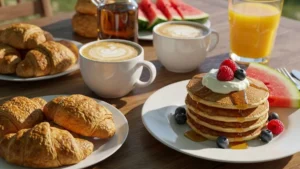Beyond alleviating symptoms, good digestion is the cornerstone of your overall well-being. Discover how to incorporate these natural allies into your diet to feel energized, full of life, and bid farewell to discomfort.
Digestion is much more than just processing food; it’s a complex system that directly influences our energy, mood, immune system, and overall health. When it functions properly, we feel light, vital, and free from discomfort.
However, today’s fast-paced lifestyle, stress, and an inadequate diet can lead to common problems such as bloating, constipation, heartburn, and a feeling of heaviness. Fortunately, nature offers us a vast array of foods that are true allies in keeping our digestive system in optimal condition.
The first pillar of healthy digestion is fiber, which comes in both soluble and insoluble forms. Insoluble fiber acts like a brush, increasing stool bulk and facilitating its passage through the intestine, preventing constipation.
Soluble fiber, on the other hand, forms a gel in the intestine that slows digestion, helps stabilize blood sugar levels, and feeds the beneficial bacteria in our intestines.
Fiber-rich foods that shouldn’t be missing from your diet include fruits like apples (with skin), pears, berries, and prunes, which also provide antioxidants. Green leafy vegetables like spinach, chard, and broccoli, along with carrots and artichokes, are excellent sources. Don’t forget legumes (lentils, chickpeas, beans) and whole grains like oats, brown rice, and whole-grain bread, which should be the foundation of your diet.
Another essential component for robust digestion is the gut microbiota, the universe of trillions of microorganisms that live in our gut. To keep it balanced and thriving, we need probiotics, which are beneficial live bacteria, and prebiotics, which are food for these bacteria.
Well-known probiotic foods include plain yogurt (without added sugar), kefir (a fermented dairy drink), sauerkraut (fermented cabbage), kimchi (a Korean fermented vegetable dish), and tempeh (a fermented soy product). These foods introduce strains of good bacteria that help break down food, absorb nutrients, and protect against pathogens.
On the other hand, prebiotic foods are essential for nourishing these beneficial bacteria. Find them in garlic, onions, asparagus, bananas (slightly green), artichokes, and oats. By consuming prebiotics, you ensure that your army of probiotics has the fuel it needs to thrive and perform its vital functions.
We can’t forget the crucial importance of hydration. Water is the essential lubricant for the digestive system. It helps soften stool, making it easier to pass and preventing constipation. Drinking enough water throughout the day is just as important as what you eat. Additionally, some herbs and spices like ginger and mint are known for their carminative and anti-inflammatory properties, relieving bloating and nausea.
Finally, beyond food, the way we eat also impacts our digestion. Chewing food well, eating slowly and in a relaxed atmosphere, and avoiding stress during meals are habits that enhance the benefits of a digestive diet. Incorporating these foods and habits gradually and consistently will transform your intestinal health and, with it, your overall well-being. Remember that, if you experience persistent digestive problems, it is always advisable to consult a healthcare professional.























+ There are no comments
Add yours